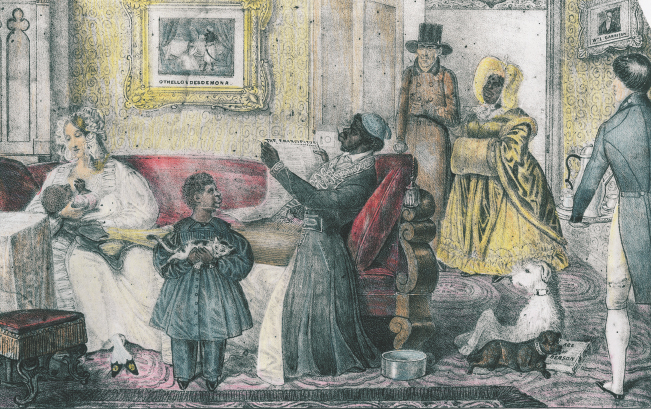The South in Black and White.
Printed Page 336 Chapter Chronology
The South in Black and White. By 1860, one in every three Southerners was black (approximately 4 million blacks to 8 million whites). In the Lower South states of Mississippi and South Carolina, blacks constituted the majority. The contrast with the North was striking: In 1860, only one Northerner in seventy-six was black (about 250,000 blacks to 19 million whites).
The presence of large numbers of African Americans had profound consequences for the South. Southern culture — language, food, music, religion, and even accents — was in part shaped by blacks. But the most direct consequence of the South's biracialism was southern whites' commitment to white supremacy. Northern whites believed in racial superiority, too, but their dedication to white supremacy lacked the intensity and urgency increasingly felt by white Southerners who lived among millions of blacks who had every reason to strike back, as Nat Turner had.
After 1820, attacks on slavery — from slaves and from northern abolitionists — caused white Southerners to make extraordinary efforts to strengthen slavery. State legislatures constructed slave codes (laws) that required the total submission of slaves. As the Louisiana code stated, a slave "owes his master ...a respect without bounds, and an absolute obedience." The laws also underlined the authority of all whites, not just masters. Any white could "correct" slaves who did not stay "in their place."
slave codes
Laws enacted in southern states in the 1820s and 1830s that required the total submission of slaves. Attacks by antislavery activists and by slaves convinced southern legislators that they had to do everything in their power to strengthen the institution.
Intellectuals joined legislators in the campaign to strengthen slavery. The South's academics, writers, and clergy employed every imaginable defense. They argued that slaves were legal property, and wasn't the protection of property the bedrock of American liberty? History also endorsed slavery, they claimed. Weren't the great civilizations — such as those of the Hebrews, Greeks, and Romans — slave societies? They argued that the Bible, properly interpreted, also sanctioned slavery. Old Testament patriarchs owned slaves, they observed, and in the New Testament, Paul returned the runaway slave Onesimus to his master. Proslavery spokesmen claimed that the freeing of slaves would lead to the sexual mixing of the races, or miscegenation.

miscegenation
Interracial sex. Proslavery spokesmen played on the fears of whites when they suggested that giving blacks equal rights would lead to miscegenation. In reality, slavery led to considerable sexual abuse of black women by their white masters.
George Fitzhugh of Virginia defended slavery by attacking the North's free-labor economy and society. Gouging capitalists exploited wageworkers unmercifully, Fitzhugh declared, and he contrasted the North's vicious free-labor system with the humane relations that he said prevailed between masters and slaves because slaves were valuable capital that masters sought to protect. John C. Calhoun, an influential southern politician, declared that in the states where slavery had been abolished, "the condition of the African, instead of being improved, has become worse," while in the slave states, the Africans "have improved greatly in every respect."
But at the heart of the defense of slavery lay the claim of black inferiority. Black enslavement was both necessary and proper, slavery's defenders argued, because Africans were lesser beings. Rather than exploitative, slavery was a mass civilizing effort that lifted lowly blacks from barbarism and savagery, taught them disciplined work, and converted them to soul-saving Christianity. According to Virginian Thomas R. Dew, most slaves were grateful. He declared that "the slaves of a good master are his warmest, most constant, and most devoted friends." (See "Documenting the American Promise.")
African slavery encouraged southern whites to unify around race rather than to divide by class. The grubbiest, most tobacco-stained white man could proudly proclaim his superiority to all blacks and his equality with the most refined southern planter. Georgia attorney Thomas R. R. Cobb observed that every white Southerner "feels that he belongs to an elevated class. It matters not that he is no slaveholder; he is not of the inferior race; he is a freeborn citizen." Consequently, the "poorest meets the richest as an equal; sits at his table with him; salutes him as a neighbor; meets him in every public assembly, and stands on the same social platform." In the South, Cobb boasted, "there is no war of classes." By providing every white Southerner membership in the ruling race, slavery helped whites bridge differences in wealth, education, and culture.